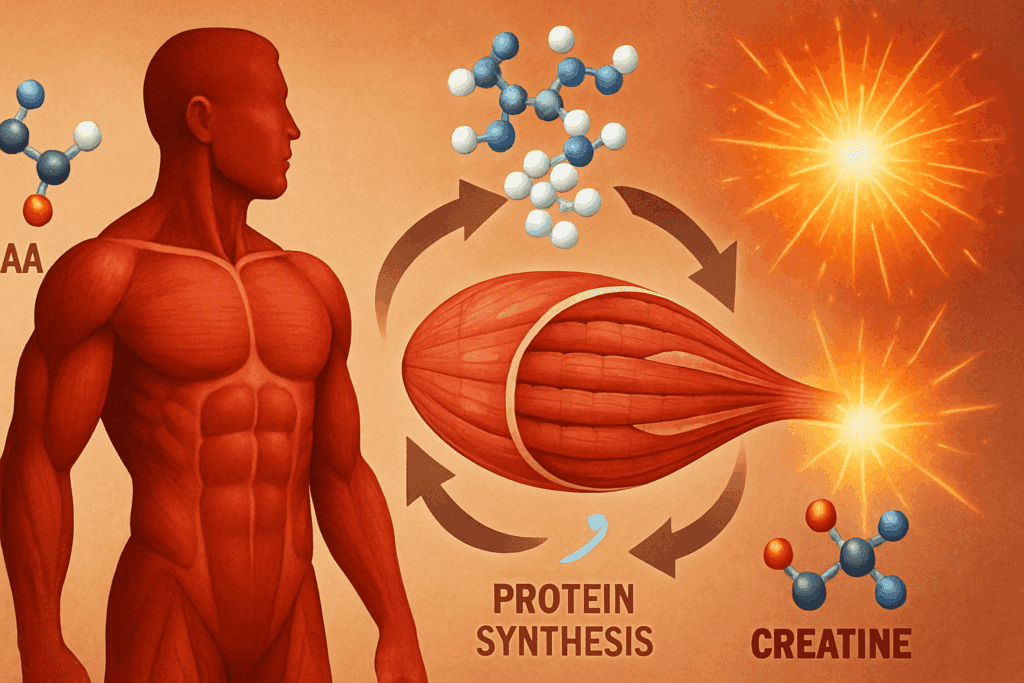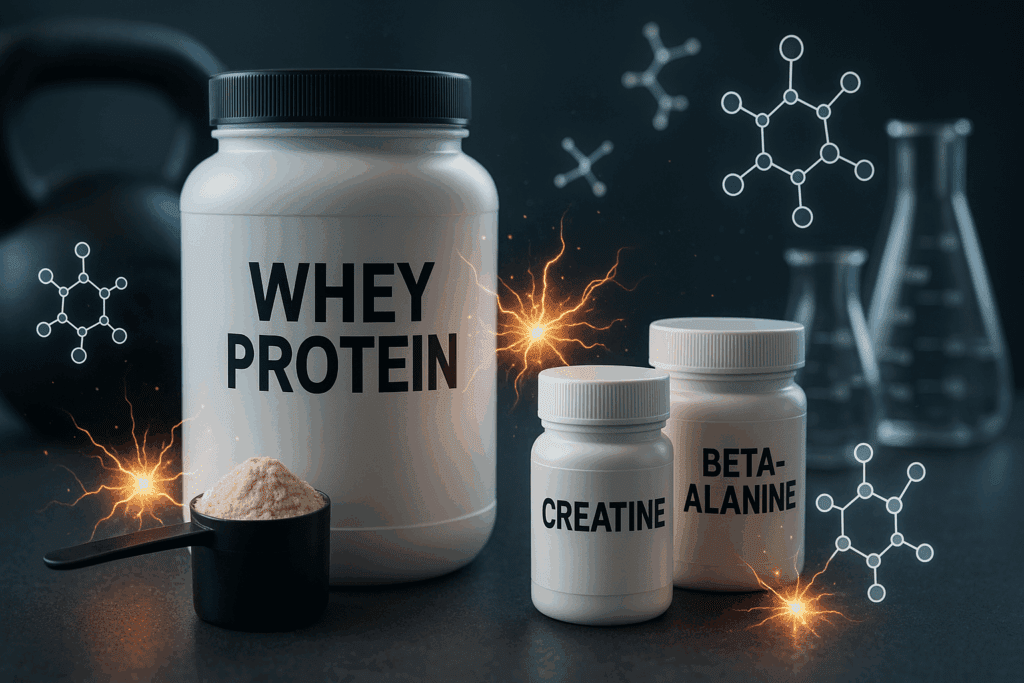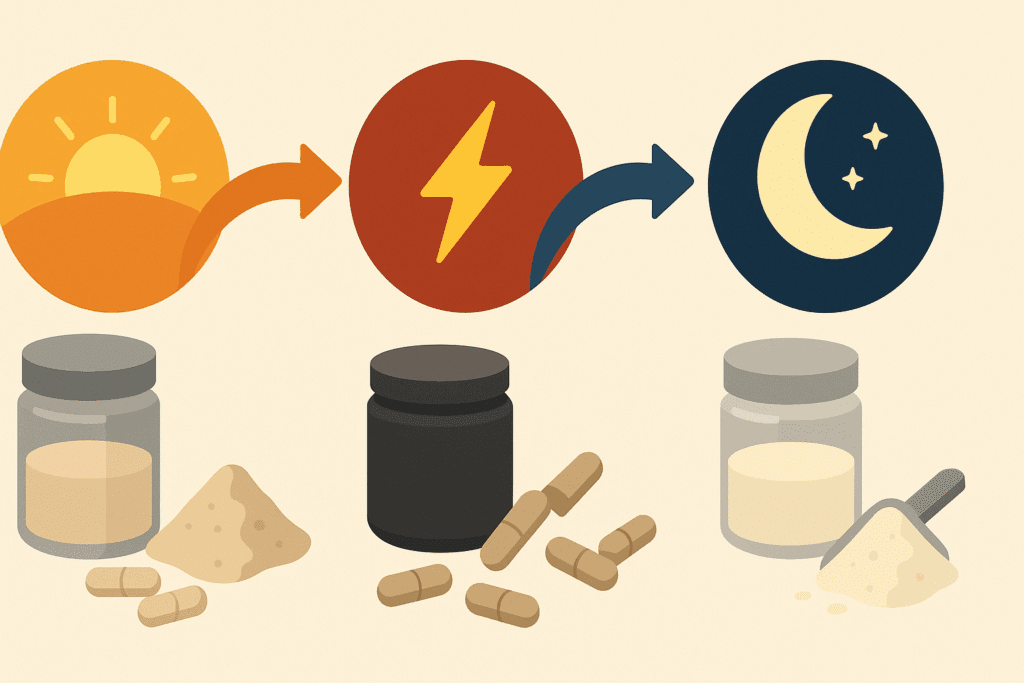Maximizing physical performance—whether for endurance, stamina, or muscular growth—requires more than just dedication in the gym. While consistent exercise and proper nutrition are essential pillars, the strategic use of supplements can elevate your training to a new level. As the science of sports nutrition has advanced, so has our understanding of what supplements can actually contribute to strength, performance, and recovery. For those wondering, “what supplements should I take for working out and muscle growth?” this in-depth exploration provides a thorough, evidence-backed guide suitable for anyone committed to optimizing their body’s potential.
Supplements for working out are not shortcuts or miracle solutions. They are tools—powerful and effective when used properly and paired with a well-balanced lifestyle. Whether you’re chasing hypertrophy, enhanced recovery, or better cardiovascular output, integrating the best workout supplements into your regimen can offer noticeable results. But which ones are truly effective, and which are simply hype? By understanding how specific muscle supplements work in synergy with training and diet, individuals can make informed choices that reflect both scientific consensus and individual needs.
You may also like: Build Strength that Lasts: Best Supplements for Stamina and Endurance Backed by Science

Understanding the Role of Muscle Building Supplements in Modern Fitness
The past decade has witnessed a significant rise in the popularity of muscle building supplements. These products are designed to support muscle repair, stimulate protein synthesis, and enhance endurance, making them an integral part of many fitness routines. What makes these supplements compelling is their ability to work with your body’s natural processes. For instance, branched-chain amino acids (BCAAs) help minimize muscle breakdown during intense sessions, while creatine monohydrate—arguably one of the most researched supplements—boosts short-burst power and muscle volume.
For college graduates or fitness enthusiasts seeking scientific validation, it is essential to differentiate between anecdotal claims and peer-reviewed evidence. Muscle gain supplements often function by either improving nutrient delivery or modulating the hormonal and cellular environments necessary for muscle adaptation. However, not all supplements offer equal benefits. Some may be marketed as good muscle supplements but lack empirical support. Thus, the question should not be merely “what is a good supplement for muscle gain?” but rather, “which supplements align with my goals, training intensity, and physiological profile?”

The Science Behind Supplements to Build Muscle Mass and Strength
Building muscle is a complex interplay of resistance training, nutrition, and recovery. Supplements for muscle development aim to support this process by improving protein utilization, boosting energy production, and reducing catabolic stress. Among the best workout supplements for men and women alike, whey protein, creatine, and beta-alanine stand out.
Whey protein is a fast-digesting protein source rich in leucine—an amino acid crucial for initiating muscle protein synthesis. Incorporating it post-workout helps repair microtears in muscle fibers, a necessary part of muscle growth. Creatine, on the other hand, increases the availability of ATP, the energy currency of cells, which can significantly enhance strength and workload capacity during short, high-intensity efforts. Beta-alanine works differently—it delays muscular fatigue by buffering lactic acid buildup, allowing for longer, more productive workouts.
These supplements are often part of a well-rounded stack designed to facilitate performance and growth. However, it’s essential to pair them with a high-protein diet and adequate caloric intake to ensure the muscle-building process is fully supported. When used intelligently, these products serve as some of the best fitness supplements for athletes and recreational lifters alike.

Best Gym Supplements for Endurance and Stamina Training
While hypertrophy gets a great deal of attention, many athletes prioritize endurance and stamina. This is where aerobic supplements and adaptogens play a critical role. Unlike traditional muscle-enhancing supplements focused on resistance training, aerobic supplements target cardiovascular efficiency and metabolic flexibility.
L-citrulline, for example, enhances nitric oxide production, leading to vasodilation and improved blood flow to working muscles. This not only supports strength but also contributes to stamina by reducing perceived exertion. Beetroot extract, another vasodilator, is rich in dietary nitrates and has been shown to improve time-to-exhaustion metrics in endurance athletes. When combined with electrolytes and adaptogens like Rhodiola rosea, which help the body resist physical and mental fatigue, these supplements form a potent base for endurance training.
The best exercise supplements for men and women focused on stamina include ingredients that support oxygen delivery, enhance mitochondrial efficiency, and delay the onset of fatigue. These characteristics make such supplements for fitness an ideal choice for marathoners, cyclists, or even HIIT enthusiasts seeking an edge in prolonged activity.

Targeted Supplements for Muscle Growth and Recovery Optimization
One of the most underappreciated aspects of training is recovery. Muscle growth does not occur during a workout but in the hours and days following intense activity. Good supplements for muscle growth often include ingredients that reduce inflammation, repair damaged tissue, and restore hormonal balance.
Casein protein, a slow-digesting protein source, is particularly effective when consumed before bedtime. Its extended amino acid release supports overnight recovery and muscle repair. Omega-3 fatty acids, though often associated with heart health, also reduce muscle soreness and improve joint function. Pairing these with adaptogens like ashwagandha can help regulate cortisol levels—important for recovery and muscle preservation.
Muscle enhancing supplements that target recovery allow the body to train more frequently and with greater intensity. This, in turn, accelerates gains in both size and performance. Strategic use of recovery-based muscle supplements supports a holistic approach to training that doesn’t just focus on what happens during the workout but also what happens between sessions.

Tailoring Supplementation Based on Individual Goals and Physiology
Not everyone responds to supplements in the same way. Genetics, diet, sleep quality, and stress levels all influence how the body utilizes nutrients. Thus, asking “what gym supplements should I take?” is a question that must be individualized. A powerlifter might benefit from a high-dose creatine and beta-alanine protocol, whereas a triathlete may focus on aerobic supplements and antioxidants.
Understanding your physiological baseline through blood work or professional assessments can help identify deficiencies or hormonal imbalances that affect performance. For example, low vitamin D levels can impair muscle function, making supplementation necessary. Similarly, vegetarians or vegans may require additional iron or B12, particularly if their energy levels are compromised.
Choosing the best workout supplements involves more than reading labels. It requires aligning supplementation with lifestyle, training goals, and bio-individual needs. This approach ensures that every supplement taken contributes meaningfully to performance and recovery without unnecessary or redundant intake.
Navigating the Supplement Market: Quality, Safety, and Transparency
With the explosion of the supplement industry, consumers are often overwhelmed by choices. However, not all muscle growth supplements are created equal. Regulatory oversight for supplements varies across regions, which means the burden of due diligence falls largely on the consumer. When selecting supplements to build muscle mass, it’s crucial to consider manufacturing practices, third-party testing, and ingredient transparency.
Reputable brands often submit their products to third-party labs like NSF or Informed-Sport for verification of ingredient purity and dosage accuracy. This is particularly important for competitive athletes, as contamination with banned substances can have serious consequences. Furthermore, high-quality supplements will avoid proprietary blends that obscure exact dosages, offering instead clear and detailed labeling.
Price is not always an indicator of quality. Some of the best supplements for working out are reasonably priced and widely available. The key lies in evaluating bioavailability, ingredient sourcing, and scientific backing. Investing time in this research ensures the supplements chosen are safe, effective, and aligned with EEAT principles—demonstrating experience, expertise, authoritativeness, and trustworthiness.
Strategic Stacking: How to Combine Supplements for Maximum Effect
Taking one supplement in isolation may offer benefits, but stacking—strategically combining multiple supplements—can produce synergistic effects. For example, pairing creatine with carbohydrates post-workout enhances its uptake by muscle cells. Combining BCAAs with electrolytes during training improves both hydration and muscular endurance. This nuanced approach allows athletes to target specific phases of training: pre-workout for energy, intra-workout for stamina, and post-workout for recovery.
Pre-workout stacks often include caffeine, beta-alanine, and L-citrulline to boost focus, power, and blood flow. Intra-workout formulas may contain BCAAs, taurine, and electrolytes to maintain performance. Post-workout stacks prioritize protein, creatine, and glutamine for muscle repair and glycogen replenishment. Understanding how these supplements interact allows users to craft a routine that maximizes the benefits of each phase.
These stacking strategies can be further tailored depending on the athlete’s focus—whether it’s muscle hypertrophy, endurance, or fat loss. When implemented thoughtfully, supplement stacks become more than just a convenience—they become a personalized system for optimal performance and recovery.

Debunking Myths and Misconceptions About Muscle Supplements
Despite the growing body of research, misconceptions about supplements persist. One common myth is that muscle gain supplements lead to unnatural or unhealthy growth. In reality, most muscle supplements work by enhancing the natural processes of muscle repair, nutrient absorption, and recovery. Another misconception is that supplements are only for professional athletes. On the contrary, the best fitness supplements offer benefits to anyone who trains regularly and seeks to optimize results.
Another persistent myth concerns the effectiveness of build muscle tablets compared to powders or drinks. While delivery method can affect absorption rate, the active ingredient’s quality and dosage are far more important. Similarly, the belief that more is better can lead to overdosing on certain compounds—potentially causing harm rather than improving performance.
Separating myth from fact requires ongoing education and a critical mindset. As research evolves, so too does our understanding of what constitutes effective supplementation. Consumers should remain cautious but curious, always prioritizing scientifically grounded information over marketing hype.
Evaluating the Long-Term Impact of Workout Supplements on Health
Beyond immediate performance enhancements, many athletes consider the long-term health implications of consistent supplement use. Fortunately, the majority of evidence-based muscle supplements—such as creatine, protein powders, and omega-3s—have demonstrated safety in long-term studies. Still, it is essential to cycle certain supplements and monitor biomarkers over time.
For instance, continuous high-dose use of pre-workout stimulants may increase cortisol and negatively affect adrenal function. This is why many experts recommend cycling stimulant-based supplements and prioritizing adrenal support through adaptogens. Blood panels can reveal how the body is responding, offering insight into kidney function, liver enzymes, and nutrient status.
Responsible supplementation is not just about enhancing today’s workout; it’s about supporting overall vitality and function in the years to come. Athletes and fitness-minded individuals should approach supplementation with a lens of longevity—selecting products that align with both immediate goals and broader health outcomes.
Frequently Asked Questions (FAQ): Muscle Supplements and Workout Optimization
- Can I use muscle building supplements during a cutting phase, or are they only effective for bulking?
Muscle building supplements are not exclusive to bulking phases. In fact, they can play an essential role during cutting by preserving lean muscle mass while you’re in a caloric deficit. Supplements for muscle development like BCAAs, whey protein, and creatine help minimize muscle loss and support recovery during lower-calorie periods. Good muscle supplements used during cutting phases may also include adaptogens like ashwagandha to support hormonal balance and reduce cortisol, which can spike under calorie restriction. Ultimately, muscle gain supplements are valuable in both cutting and bulking, provided they’re integrated with dietary strategy and training intensity.
- What are some overlooked but effective supplements for fitness that support long-term results?
Many people focus heavily on high-profile products but overlook foundational supplements for fitness that offer cumulative benefits over time. For example, magnesium and zinc support recovery, hormone regulation, and neuromuscular function—factors that enhance consistency in training. Similarly, adaptogenic herbs like Rhodiola rosea and Panax ginseng improve resilience and energy metabolism, making them ideal additions to any stack of best fitness supplements. Including such micronutrients alongside your muscle growth supplements provides long-term sustainability and reduces the likelihood of training plateaus. These lesser-known yet powerful ingredients work in tandem with traditional workout supplements to support your overall health and performance.
- Are build muscle tablets as effective as powders and drinks?
Build muscle tablets can be effective, but their efficacy depends on bioavailability and formulation. Unlike powders, tablets may take longer to digest and are often lower in dosage due to size constraints. However, they offer convenience and portability, which can be advantageous for those with busy lifestyles. When choosing muscle enhancing supplements in tablet form, it’s critical to review the ingredient transparency, third-party testing, and dosage recommendations. While the best workout supplements are often found in powder form due to faster absorption, tablets can still be part of a solid strategy if carefully selected.
- What psychological factors should I consider when choosing the best gym supplements?
Choosing the best gym supplements isn’t just a physical decision—it has psychological dimensions as well. Confidence in your supplement stack can significantly affect motivation, workout adherence, and perceived effectiveness. Additionally, some supplements like tyrosine and L-theanine can enhance cognitive function, mood, and focus, which directly influence workout quality. It’s also important to recognize the placebo effect, where belief in a supplement’s efficacy can boost performance. Combining mentally uplifting products with scientifically backed muscle supplements ensures both physical and psychological readiness for consistent training.
- What are the risks of relying too heavily on supplements for working out instead of food?
While supplements for working out are designed to fill nutritional gaps, they should not replace a nutrient-dense diet. Over-reliance on supplements can mask deficiencies or imbalances in whole food intake, ultimately undermining performance and recovery. For instance, relying on protein powders instead of high-quality meals may lead to missed opportunities for micronutrient diversity. Even the best workout supplements for men or women cannot replicate the complex phytonutrients, fibers, and enzymes found in whole foods. Supplements should complement—not dominate—a well-rounded nutrition strategy tailored to your training goals.
- Are there specific muscle gain supplements that support hormonal balance naturally?
Yes, several muscle gain supplements are known to support hormone regulation, which is essential for muscle synthesis and overall vitality. Zinc and magnesium, often found in ZMA supplements, play vital roles in testosterone production and sleep quality—both critical for muscle repair. Adaptogens such as ashwagandha and maca root can also help normalize cortisol and boost libido, indirectly enhancing performance. These ingredients are sometimes found in body muscle growth supplements designed for holistic development. Integrating hormone-supportive components alongside the best supplements for working out ensures that internal systems align with physical output.
- How do aerobic supplements fit into a strength-based program?
Although typically associated with endurance, aerobic supplements have value in strength-focused routines. Enhanced oxygen delivery and improved circulation from compounds like beetroot extract and L-citrulline can boost muscular endurance during high-rep sets or supersets. This allows for better volume accumulation, which contributes to hypertrophy. Additionally, aerobic supplements help buffer lactic acid and reduce perceived exertion, which supports training frequency and intensity. By combining these with classic muscle growth supplements, athletes can build a comprehensive program that supports both strength and stamina.
- What supplements can I take to build muscle as a vegetarian or vegan?
Vegetarians and vegans can absolutely make gains with the right supplements to build muscle mass, especially when mindful of key nutrient gaps. Plant-based protein powders like pea, rice, or hemp are essential as alternatives to whey. Creatine monohydrate, although synthetically produced and vegan-friendly, remains one of the best muscle supplements for enhancing size and strength. Additionally, vitamin B12, iron, and omega-3s are critical for energy production and recovery. Choosing well-rounded, high-quality muscle gain supplements formulated for plant-based diets ensures effectiveness without compromising dietary ethics.
- What supplement is best for muscle growth if I struggle with appetite?
For individuals who find it difficult to consume enough calories, the best supplement for muscle growth often includes calorie-dense mass gainers. These combine high levels of protein and carbohydrates to help meet daily intake needs. Appetite-stimulating ingredients like fenugreek or ginger extract can also be found in some advanced formulas. Additionally, liquid forms of supplements—like protein shakes and smoothies—may be easier to digest and consume than solid meals. Combining these with fast-acting muscle supplements like creatine or BCAAs supports both caloric intake and muscle anabolism in a practical way.
- What workout supplements should I take if I train in the evening or late at night?
For late-night training sessions, it’s essential to avoid stimulants that may disrupt sleep. Instead of caffeine-heavy pre-workouts, opt for non-stimulant supplements such as beta-alanine, L-citrulline, and taurine. These still provide performance benefits without interfering with rest. Good supplements for muscle growth post-evening workouts include casein protein and magnesium, which support overnight recovery. Choosing the best workout supplements based on training time helps balance physical progress with circadian health, ensuring you recover efficiently without compromising sleep quality.
Final Thoughts: Choosing the Best Supplements for Muscle Growth, Strength, and Endurance
Navigating the world of muscle supplements can be daunting, but with the right knowledge, it becomes a journey of empowerment. Understanding what workout supplements should I take begins with self-awareness—knowing your goals, limitations, and physiology. From there, choosing the best gym supplements or supplements for fitness becomes a matter of aligning products with evidence-based benefits.
The best workout supplements for men and women are not just those with flashy packaging or celebrity endorsements, but those backed by science and tailored to individual needs. Whether you’re seeking muscle growth supplements to support hypertrophy, aerobic supplements to boost endurance, or build muscle vitamins to support cellular repair, the foundation remains the same: quality, consistency, and education.
Ultimately, supplementation is a supportive element—not a substitute—for smart training and proper nutrition. When approached with discernment and intentionality, supplements for working out can provide a significant edge in the pursuit of strength, stamina, and lasting performance gains. As fitness evolves and science advances, the integration of supplements will continue to play a vital role in maximizing human potential on and off the gym floor.
Was this article helpful? Don’t let it stop with you. Share it right now with someone who needs to see it—whether it’s a friend, a colleague, or your whole network. And if staying ahead on this topic matters to you, subscribe to this publication for the most up-to-date information. You’ll get the latest insights delivered straight to you—no searching, no missing out.
Further Reading:
10 Supplements That Promote Muscle Growth

